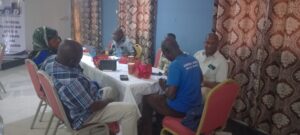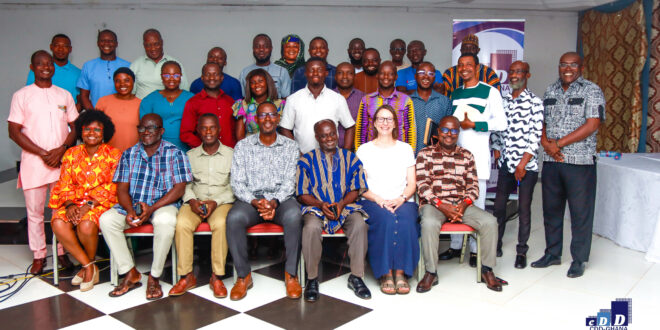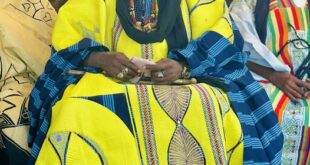The Center for Democratic Development Ghana (CDD-Ghana), in collaboration with the London School of Economics (LSE), the University of Ghana, and the University of Manchester, has presented key findings from a comprehensive research project exploring the role of self-building housing in urban and economic development in Ghana.
The event which took place at A.J. Plaza Hotel in Techiman brought together researchers, traditional leaders, policymakers, and community members to discuss the transformative role of self-built homes in shaping African cities, particularly in Accra and Techiman. The research, led by Professor Claire Mercer, Professor of Human Geography at LSE, delves into the dynamics, challenges, and economic opportunities of home-grown growth in urban Ghana.
The research, conducted in Accra and two communities in Techiman (Tako Fiano and Hansua), identified several key trends. It found that most landlords are older adults and women, while younger people are more likely to be tenants. Land for housing is typically acquired through purchase, and the building process is often intergenerational, reflecting the long timelines and significant financial investment required to complete self-built homes.
Prof. George Owusu, a professor at the Institute of Statistical, Social and Economic Research (ISSER) and Director of the Centre for Urban Management Studies at the University of Ghana, Legon, disclosed during his presentation that self-building plays a critical role in both housing provision and economic growth in Ghana especially in urban communities, with over 90% of homes in the country being constructed through self-building. However, he noted that despite the benefits of self-building, there is no national policy that directly supports it as a legitimate and strategic approach to housing development.
“The aim of our research was to examine how self-building housing contributes to urban and economic development. Our study focused on Accra and Techiman. We found that most houses in Ghana about 90% of housing are built through self-building. However, there is currently no national policy to support self-building housing.

“Despite this lack of policy, self-building housing significantly contributes to economic growth. It generates employment for masons, carpenters, electricians, laborers, and traders in building materials, among others.” He stated.
Prof. George Owusu further explained that although self-building is widespread and plays a vital role in Ghana’s economic growth, it also presents significant challenges. According to him, the research revealed issues such as limited access to land, poor infrastructure including inadequate roads, water supply, and drainage systems,, delays in completing housing projects, and weak enforcement of formal planning regulations, all of which undermine the effectiveness and safety of many self-built communities.
“However, it also presents challenges. Unregulated self-building can lead to community expansion without the necessary infrastructure and services, making life difficult for residents. Therefore, we urge Municipal Assemblies to work closely with traditional leaders whenever a community is expanding. This collaboration will ensure that land is reserved for essential infrastructure like roads, schools, and markets.
He used the opportunity to call on Municipal and District Assemblies to work closely with traditional authorities to ensure land is reserved for public infrastructure such as roads, schools, and markets as communities expand.
“We call on the government to create an enabling environment to support individuals who wish to build their own homes. Unlike some countries where governments provide affordable housing for citizens, that is not yet the case in Ghana, many people still need to build their own homes to have a place to live.

“The District and Municipal Assemblies must also enforce regulations related to community expansion and housing. Without proper enforcement, buildings may go up without supporting infrastructure, leading to problems such as flooding and poor sanitation.
“Even though there is no official policy on self-building housing, it is widely practiced and accepted in Ghana. Therefore, it is essential for local authorities and the government to implement measures that guide and support proper self-building practices across the country.” He said
As part of the workshop, participants were grouped to discuss three critical issues: how young people are securing their housing future, women’s access to home ownership, and what policymakers can do to support Ghana’s housing economy.
The Techiman Baamu and Hansua Abusuapanin, Nana Agyemang, used the opportunity after the group discussions to dispel misconceptions surrounding land sales by chiefs. He explained that, contrary to the perception that chiefs sell land at high prices making it difficult for young people to acquire land for housing. He disclosed that chiefs only allocate land to individuals, who then show appreciation. These gestures of appreciation, he emphasized, should not be mistaken for commercial transactions.
Addressing the challenges faced by the youth in acquiring land for housing projects, he advised them to approach chiefs in their respective communities directly, rather than relying on third parties.

“The workshop has really enlightened us. I had the opportunity to clarify a common misconception: no chief sells land. Chiefs only allocate land to individuals who intend to start a project, and in return, the individual expresses appreciation to the chief. That is why, traditionally, when someone acquires land, they are given two years to develop it. If they fail, the chief has the right to reclaim the land and allocate it to someone else who is ready to develop it.
“However, most chiefs are lenient and often overlook the two-year deadline because they want the best for their people. But this should not be mistaken for a sale of the land. Sadly, many individuals acquire land from chiefs not with the intention of developing it, but as an investment. They simply wait for the land to appreciate in value and then sell it at a higher price.” He explained.
“This workshop has broadened our understanding of the challenges young people face in acquiring land and how best these issues can be addressed. We will continue to encourage the youth to approach their local chiefs directly when they need land for a project.
“It is far easier to acquire land for a house or project by going directly to the chief in the area, rather than relying on intermediaries. I encourage all young people to follow the right channels by dealing directly with the chiefs of their respective communities.” He stated.
Former Techiman South Municipal Chief Executive, Prince Yaw Donyina, emphasized the importance of making land more affordable for young people. He urged chiefs and the municipal assembly to establish land banks to help future generations access land for housing projects at affordable prices.

“Based on our research findings, we discovered that over 90% of houses in the country are built through self-building. However, many young people struggle to acquire land due to the high cost, especially in Techiman and its surrounding areas.
“Since self-building is the dominant housing method in Ghana, I urge chiefs to make land more affordable for the youth. One solution could be the creation of land banks to help future generations access land at affordable prices.” He stated
The former MCE also encouraged the youth to collaborate with friends and family members to jointly acquire plots of land, which they could later divide among themselves. He noted that this practice was commonly used by their forefathers in land acquisition.
Prince Yaw Donyima commended the researchers for their good work done.
“I also advise young people not to focus solely on acquiring land in city centers. Land on the outskirts is usually more affordable and just as valuable for development. Youth can even come together to jointly acquire large plots of land and later divide them among themselves something our forefathers used to do.

“Overall, the research is very valuable. Its findings will help us understand how self-building housing contributes to urban and economic growth in the country.” Former Techiman South Municipal Chief Executive, Prince Yaw Donyina.” He said.
Source: Ghanaweb.mobi
 Home Of Ghana News Ghana News, Entertainment And More
Home Of Ghana News Ghana News, Entertainment And More





